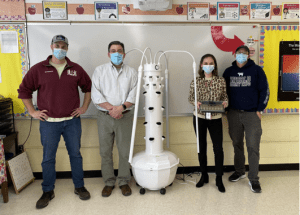
A good side of the Coronavirus Pandemic, people want to eat and live locally. As we are becoming more and more aware of our neighboring farms, farmers, and small businesses a push to be local seems to have swept the nation. That is no different in Connecticut where Litchfield County UConn 4-H Extension Educator Bill Davenport is bringing that food and individual connection to the classroom.
At Mitchell Elementary School in Woodbury, Davenport helped bring UConn 4-H’s first ever tower garden to students to teach them the importance of agriculture and sustainably grown food. Alongside Tyler Cremeans (Aquaponics and Farm to Table teacher at Nonnewaug High School’s Agriscience Program), John Dominello (Culinary and Farm to Table Teacher at Nonnewaug High School), and Shelby Hale (Science Instructional Coach at Mitchell Elementary School) they plan to provide the students not only with the tower garden but also have high school students and 4-H club officers from the agriscience program mentor the younger learners.
To Davenport this is simply the very beginning of what can become a collaborative effort between 4-H clubs and members across the state and the elementary schools in their communities. With the goal to have two of these tower gardens up and growing within the coming weeks at Mitchell Elementary School and Bethlehem Elementary school this is the start of a much larger project to help UConn 4-H members collaborate with younger community members. Not only will there be collaboration amongst 4-H, but Davenport hopes to bring in individuals from the Northwest Conservation District and the Bethlehem Conservation
Commission turning this into a community based effort. The project has the potential to gain traction and result in tower gardens being provided to schools and students across Connecticut. Teaching elementary students about the environment, agriculture, and sustainability through a hands-on-learning approach helps foster a population that understands where their food comes
from, how it is grown, and how to do so sustainably.